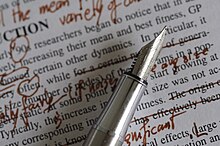Developmental editing

Developmental editing is a form of writing support that comes into play before or during the production of a publishable manuscript, in fiction, non-fiction, and academic writing (including textbooks). As explained by Scott Norton in his book Developmental editing: a handbook for freelancers, authors, and publishers, developmental editing involves "significant structuring or restructuring of a manuscript's discourse".[1] Developmental editors are a type of language professional.
The work of developmental editors
A developmental editor may guide an author (or group of authors) in conceiving the topic, planning the overall structure, and developing an outline—and may coach authors in their writing, chapter by chapter.
Irrespective of when the developmental editor is brought into a writing project, authors retain control over the document and are responsible for providing the content. Developmental editors typically don't make the changes directly to the manuscript but instead provide guidance and suggestions, although some "hands-on editing is used to illustrate principles of craft and mechanics."[4] An editor who creates significant amounts of content is no longer an editor but a contributing author or a ghostwriter.[1] After completing a developmental edit, an editor typically provides a letter to the author (often in the form of an email) explaining the main suggestions.[5]
A developmental editor aims to make a very marketable book that answers the intended audience’s needs. If by the end of a book/publication the reader doesn’t feel their needs have been met (that the publication didn’t deliver on its promises), then the developmental editor hasn’t done their job in helping meet the mission and vision set out in the book’s proposal. As the book proposal is based on solid research of audience needs and competitor publications, it’s really important to meet the aims set out in it.[6]
In a traditional publishing house, developmental editors work with an author to refine the manuscript. Many publishing houses today, however, do little developmental editing. Instead, they rely on agents to vet and submit manuscripts that are already in shape, reducing the work required in the developmental editing stage.[7]
Textbooks
Textbooks represent one book genre in which developmental editors are involved from the beginning, and often serve as the book's project manager.[8][9] Their role is fundamental in textbook publishing because it is often the publisher, not the author, who decides on the book's content, scope, and level. Thus, developmental editors are often on staff at scholastic publishing houses.[10] In textbook publishing, the developmental editor may be responsible for creating the outline to guide the author's writing—and may also prepare short parts of text, such as legends, exercises, and supporting materials.[8][9] Furthermore, the editor manages text length, edits the developing manuscript, and may instruct an artist regarding illustrations.[11]
Academic Research
When it comes to academic research, career advancement and
There are two main situations when developmental editing in the research setting can be useful.
Whether the language professional is an authors' editor, a teacher of academic writing, or a translator, the particularly challenging situation requires developmental editing alongside other writing support services (e.g., education about good writing practices, translation, and linguistic editing). Language professionals who support such novice researcher-authors know to perform editorial—not authorial—duties, so they avoid
Fiction
The tasks that developmental editors face in fiction are fairly different from those faced by editors working with nonfiction.[17] Adam O'Connor Rodriguez, senior editor at Hawthorn books, splits the tasks of developmental fiction editing into three main parts: structure, narrative, and language.[18]
Structure is the container that holds the story, including its length, order, and pacing. Narrative is all of the story elements such as characters, major scenes, pacing, and other big picture elements. Language includes dialogue, physical description, sensory information, and sentence structure (O'Connor Rodriguez 2018).[18]
For example, an editor would take a finished manuscript and provide ideas for fixing plot holes, inconsistencies in characters, scenes that need more depth, and scenes that need to be cut.[17]
References
- ^ ISBN 9780226595146.
- ISBN 978-0-226-29983-9.
- ISBN 978-1843346661.
- ^ Editorial Department. "Spotlight on Developmental Editing". The Editorial Department. Retrieved 19 October 2022.
- ^ "Hiring an Editor: A Guide for New Authors" (PDF). Editorial Freelancers Association. Retrieved 2023-03-08.
- ^ "What is developmental editing? - Jo Finchen-Parsons Editorial". 6 May 2020.
- ISBN 9781613749739.
- ^ a b Battistella, Edwin. "An interview with Pat Brewer". Welcome to Literary Ashland. Retrieved 5 March 2013.
- ^ JSTOR 1312899.
- ISBN 9780226288529.
- )
- ^ ISBN 978-1843346661.
- S2CID 31801582.
- S2CID 78135567.
- PMID 14748862.
- S2CID 45444934.
- ^ ISBN 9781880407738.
- ^ a b Argy, Stephanie (2018-05-15). "The Role of the Developmental Editor in Emerging Forms of Narrative". Book Publishing Final Research Paper.
